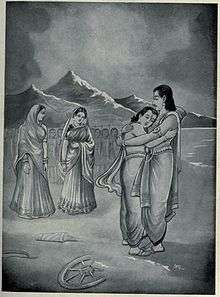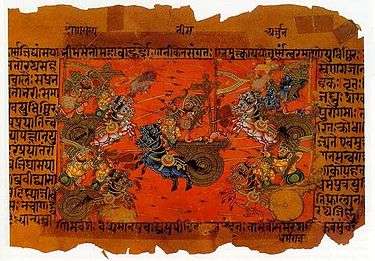Babruvahana
| Babruvahana | |
|---|---|
 Arjuna hugs Babruvahana |
Babruvahana (also known as Babhruvahana or Babhnu Vahana) is a character in Veda Vyasa's epic, the Mahabharata. He is one of the sons of Arjuna, a Pandava, begotten through Chitrangada, the princess of Manipura during the period of his (Arjuna's) exile at Manipura (refer Arjuna Vanavasa Parva of Mahabharata). Arjuna leaves Chitrangada due to a treacherous plot by Arjuna's wife Uloopi from the Naga Clan and Uloopi was envious of Arjuna's marriage to Chitrangada. Babruvahana was adopted as the son of his maternal grandfather and reigned at Manipura as his successor. He dwelt there in a palace of great splendour, surrounded with wealth and signs of power. Later he came to know Arjuna was his father, and when he came to see the his father, Arjuna did not recognise him and said he was a wanderer.
Legend
When Arjuna went to Manipura with the wandering sacrificial horse of the Aswamedha, Babruvahana captured the horse, which, by tradition, meant war against the Pandavas. Arjuna tried to persuade Babruvahana to leave the horse as there was no enmity between Manipura and Hastinapura. Babruvanahana agreed with Arjuna but informed him that he wished to defeat Arjuna for his Guru Dakshina. Arjuna, reluctant to fight a young boy, left and informed a small troop of his army to convince Babruvahana to give the horse back. Babruvahana defeated the army. He also defeated Bheema. Arjuna took an oath to kill Babruvahana or immolate himself if defeated. King Babhruvahana killed his father Arjuna with an arrow, a boon given to him by Ganga, Bhishma's mother. Repenting his deed after knowing Arjuna's identity, he was determined to kill himself, but he obtained from his stepmother, the Naga princess Uloopi, a gem called Nagamani which restored Arjuna to life with the help of Krishna. Arjuna, however, repented that he wouldn't be able to be able to live with the remorse due to Vrishtaketu's death, as he was the one who had ordered Vrishtaketu to engage in battle. Krishna, however, promised that he would restore Vrishtaketu's life. After Vrishtaketu was revived by Krishna, Babruvahana asked Vrishtaketu to forgive him (which he did). Vrishtaketu lauded Babruvahana's skill in war. Then, the Pandavas, Uloopi, Chitrangada, Babruvahana, Vrishtaketu and the armies returned to Hastinapura.

Film Adaptation
The story of Babruvahana has been made into films in Telugu in 1942 and 1964 and in Kannada in 1977. The 1964 Telugu film was written and directed by Samudrala Raghavacharya and starred N. T. Rama Rao, S. Varalakshmi and Chalam.
The Kannada language film, Babruvahana was written and directed by Hunsur Krishnamurthy and starred Rajkumar as Arjuna and Babruvahana in a dual role, B. Saroja Devi as Chitrāngadā, Kanchana as Uloopi and Jayamala as Subhadra.
Bibliography
- Mazumdar, Subash (1988). Who is Who in the Mahabharata. Bharatiya Vidya Bhavan. p. 32.
- Laura Gibbs, Ph.D. Modern Languages MLLL-4993. Indian Epics.
- Dowson's Classical Dictionary of Hindu Mythology
References
External links

